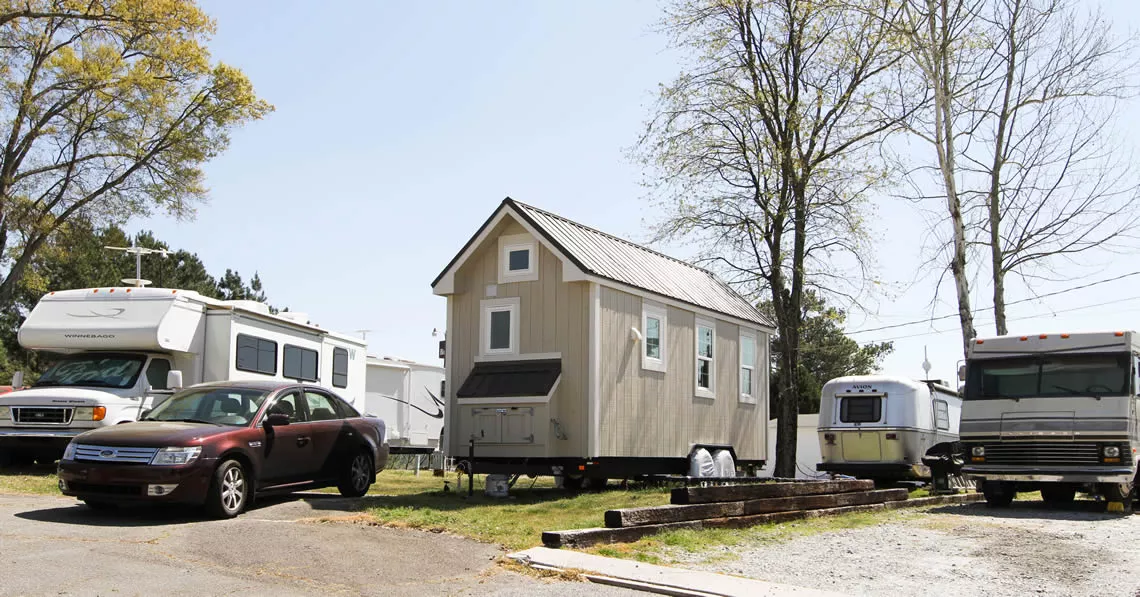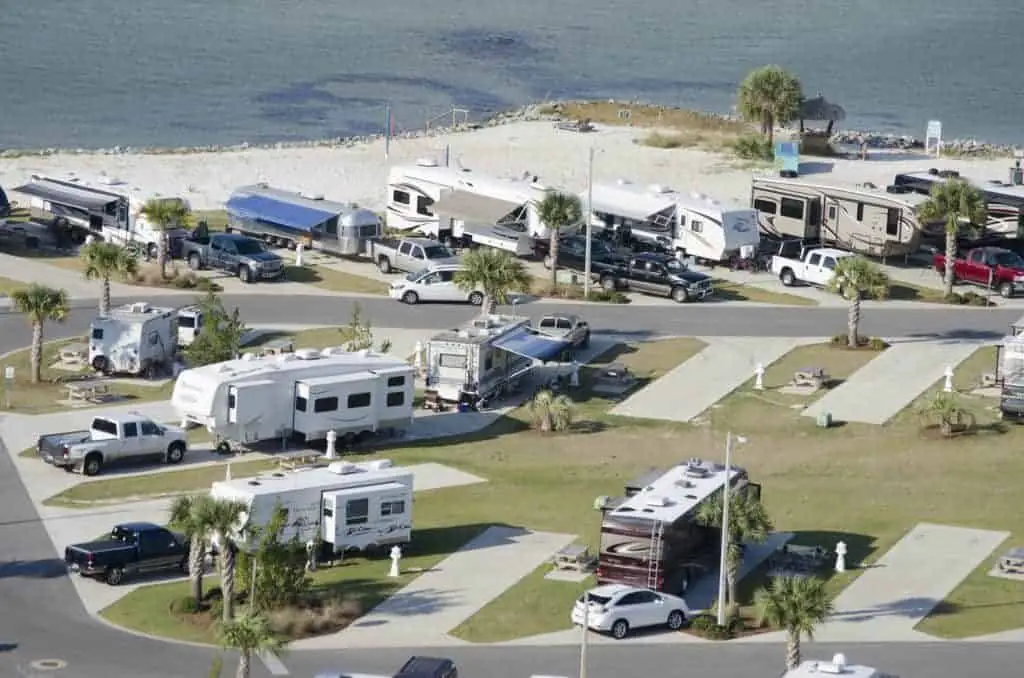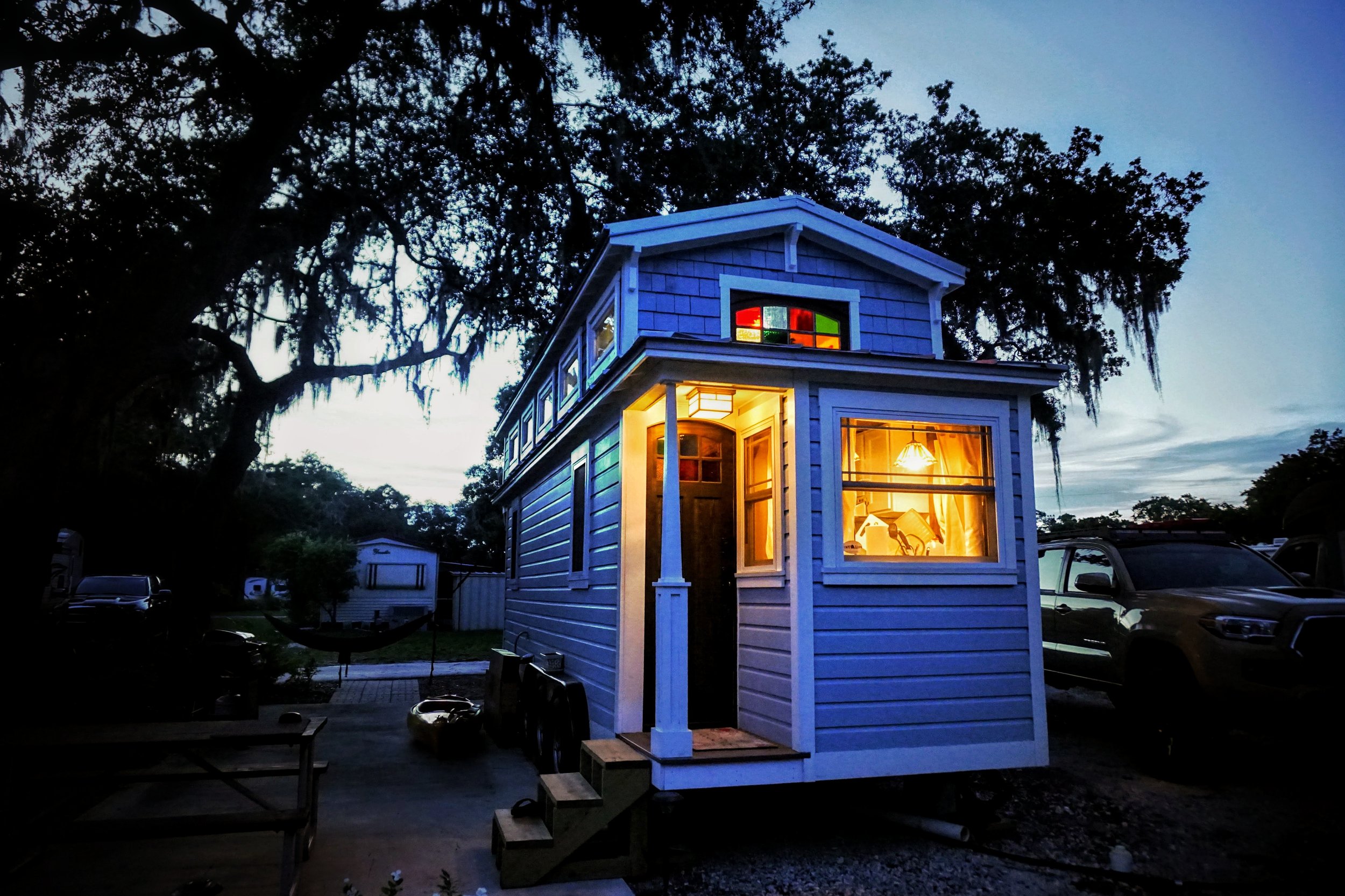You’ve built your perfect tiny home, a cozy and compact space that suits your lifestyle perfectly. But now you’re faced with the question of where to park it. Wondering if you can find a spot in an RV park? The answer might just surprise you. In this article, we’ll explore the possibilities and regulations surrounding the parking of tiny homes in RV parks, helping you navigate this exciting chapter in your tiny living adventure.

What Is an RV Park?
An RV park, also known as a campground, is a designated area where individuals can park their recreational vehicles, such as motorhomes, travel trailers, or campervans, for a temporary stay. RV parks often offer various amenities and facilities to cater to the needs of RV owners, providing a convenient and comfortable environment for their stay.
Definition of an RV Park
An RV park is a dedicated space specifically designed and equipped to accommodate recreational vehicles. These parks typically offer sites with electrical, water, and sewage hookups, allowing RV owners to enjoy a comfortable and convenient camping experience. They may also provide additional amenities, such as restrooms, showers, laundry facilities, picnic areas, and recreational activities.
Features and Amenities
RV parks boast a wide range of features and amenities to enhance the camping experience for their guests. These can include spacious campsites with picnic tables and fire pits, well-maintained hiking trails, swimming pools, playgrounds, and even camp stores where visitors can purchase camping essentials and supplies. Many parks also offer WiFi, cable TV hookups, and even pet-friendly areas to cater to the needs of their guests.
Rules and Regulations
To ensure a pleasant and enjoyable experience for all guests, RV parks have specific rules and regulations in place. These guidelines typically cover areas such as quiet hours, pet policies, speed limits within the park, and restrictions on open fires. It’s important to familiarize yourself with these rules before parking your tiny home in an RV park to avoid any conflicts or disturbances during your stay.
What Is a Tiny Home?
A tiny home, sometimes referred to as a tiny house, is a compact and often mobile dwelling that maximizes space efficiency. It is typically smaller than a traditional house, often measuring less than 400 square feet, and is designed to provide a minimalist yet functional living space.
Definition of a Tiny Home
A tiny home is a dwelling that embraces the principles of downsizing and simplifying one’s living space. These homes are usually built on a trailer or a foundation with the aim of reducing environmental impact and living expenses. While they come in various shapes and sizes, all tiny homes share the common feature of optimizing space utilization.
Types of Tiny Homes
There are several types of tiny homes, each catering to different needs and preferences. Some popular variations include:
- Tiny Houses on Wheels: These are mobile tiny homes built on trailers, allowing for flexible placement and portability.
- Tiny Houses on Foundations: These tiny homes are built on a permanent foundation and often comply with local building codes and regulations.
- Container Homes: Repurposed shipping containers can be transformed into cozy tiny homes, offering an alternative and sustainable housing option.
- Prefab Tiny Homes: Prefabricated tiny homes are factory-built structures that can be easily transported and assembled on-site.
Benefits of Living in a Tiny Home
Living in a tiny home offers numerous advantages that appeal to people seeking a simplified lifestyle. Some key benefits include:
- Affordability: Tiny homes are typically more affordable than traditional houses, as their smaller size reduces construction costs and ongoing maintenance expenses.
- Minimal Environmental Impact: With their reduced energy consumption and smaller footprint, tiny homes are an eco-friendly housing option for those looking to decrease their environmental impact.
- Simplicity and Minimalism: The limited space in a tiny home encourages individuals to declutter and adopt a minimalist lifestyle, leading to reduced stress and improved overall well-being.
- Mobility and Flexibility: Tiny homes on wheels offer the freedom to travel and experience different locations without sacrificing the comforts of home.
- Lower Utility Costs: The smaller size of a tiny home requires less energy to heat or cool, resulting in lower utility bills.
The Compatibility of Tiny Homes in RV Parks
With their compact size and portability, tiny homes may seem like a perfect fit for RV parks. However, the compatibility of parking a tiny home in an RV park depends on the park’s policies and regulations.
General Policies of RV Parks
RV parks typically have policies in place to ensure the smooth operation and enjoyment of all guests. It is essential to review these policies to understand if they permit or restrict the parking of tiny homes. Some RV parks may have specific requirements regarding the size, type, and appearance of the RVs or tiny homes allowed on their premises.
Restrictions on Tiny Homes
While some RV parks embrace the flexibility of tiny homes, others may have restrictions on their acceptance. These restrictions can be based on concerns such as the appearance, size, or compliance with local building codes. Some parks may only allow RVs or structures that meet specific size criteria or are certified by recognized organizations like the Recreation Vehicle Industry Association (RVIA).
Important Considerations before Parking a Tiny Home in an RV Park
Before deciding to park your tiny home in an RV park, it is crucial to consider various factors to ensure a smooth and hassle-free experience.
Size and Weight Restrictions
RV parks often have size and weight restrictions to ensure the safety of their infrastructure and the comfort of their guests. It’s important to verify if your tiny home meets the park’s requirements, including height, width, and length restrictions. Additionally, assess whether your tiny home is compliant with towing requirements if it is a mobile unit.
Hookup and Utilities
Ensure that the RV park you choose can provide the necessary utilities and hookups for your tiny home. These typically include electrical, water, and sewer connections. Assess the capacity of the park’s electrical system to ensure it can handle your tiny home’s power needs. It’s also important to inquire about the availability of WiFi, cable TV, and propane services, if desired.
Duration of Stay
Every RV park has specific guidelines regarding the length of stay for guests. Some parks may allow extended stays or offer monthly rates, while others focus on shorter-term stays or seasonal accommodations. Determine the duration of your intended stay and verify if the park aligns with your needs.

Benefits of Parking Your Tiny Home in an RV Park
Choosing to park your tiny home in an RV park offers several advantages that can enhance your overall living experience.
Affordability
RV parks often provide more cost-effective options compared to traditional housing arrangements. Monthly rates in RV parks can be significantly lower than renting a traditional home or apartment, allowing you to save money while enjoying the comforts of a secure and well-maintained park.
Community and Social Opportunities
Living in an RV park offers a unique opportunity to become part of a vibrant and diverse community. Many parks organize social events, group activities, and recreational facilities that foster a sense of camaraderie among residents. This can be particularly beneficial for those who enjoy socializing and forming connections with like-minded individuals.
Convenience and Accessibility
RV parks are specifically designed to provide convenient amenities and services to their guests. From laundry facilities and shower areas to onsite maintenance and security, these amenities ensure that residents have everything they need within reach. Additionally, the central location of many parks allows for easy access to shopping centers, restaurants, and entertainment options.
Steps to Park Your Tiny Home in an RV Park
To park your tiny home in an RV park, it’s important to follow a few essential steps to ensure a seamless process.
Research and Find Suitable RV Parks
Begin by researching RV parks in your desired location that accommodate tiny homes. Look for parks that align with your needs, preferences, and budget. Consider factors such as the amenities offered, location, and overall atmosphere of the park.
Review the Park’s Policies
Carefully review the policies and regulations of each RV park you are considering. Pay close attention to any specific rules regarding tiny homes to ensure that your tiny home complies with their requirements. If in doubt, contact the park management directly to clarify any questions or concerns you may have.
Make a Reservation
Once you have identified a suitable RV park, contact them to inquire about reservation availability. Many popular RV parks have limited space and high demand, so it’s advisable to book your spot well in advance to secure your preferred dates. Provide all necessary information about your tiny home to the park management and confirm the details of your stay.

Alternative Options for Tiny Home Parking
If parking your tiny home in an RV park is not feasible or desirable for you, there are alternative options to consider.
Tiny Home Communities
Tiny home communities are specifically designed to accommodate tiny homes, creating a neighborhood-like atmosphere for residents. These communities often have shared facilities and amenities, fostering a strong sense of community among the residents.
Backyard Parking
If you have access to a suitable backyard or property, parking your tiny home in a private setting may be an option. However, it’s important to verify if local regulations and zoning ordinances permit this arrangement. Consult with your local authorities and neighbors to ensure compliance and avoid any potential issues.
Mobile Home Parks
Mobile home parks, similar to RV parks, offer spaces for various types of mobile dwellings, including tiny homes. These parks typically have more relaxed regulations and may accommodate tiny homes that wouldn’t be permitted in traditional neighborhoods. However, be sure to review the park’s policies and ensure a suitable match for your needs.
Experiences and Challenges of Parking a Tiny Home in an RV Park
Many individuals have successfully parked their tiny homes in RV parks and embraced the benefits of this living arrangement. However, it’s essential to consider some common challenges that may arise.
Success Stories
Numerous success stories highlight the seamless integration of tiny homes into RV parks. Individuals and families have found community, affordability, and convenience in these parks, enjoying a fulfilling and comfortable lifestyle.
Common Challenges to Consider
While many RV parks welcome tiny homes, there can be challenges depending on the park’s specific policies and regulations. Common challenges include:
- Size Restrictions: RV parks may have limited space or specific size requirements that may not be suitable for all tiny home designs.
- Building Code Compliance: Some parks may require tiny homes to meet specific building codes or certifications, which can pose challenges for certain structures.
- Permits and Zoning: Local regulations and zoning restrictions may limit or prohibit the parking of tiny homes in certain RV parks.
- Limited Amenities: Not all RV parks offer the same amenities or social opportunities, so finding a park that matches your preferences and expectations may require some research.
Legal Considerations for Parking a Tiny Home in an RV Park
Before parking your tiny home in an RV park, it’s important to consider and comply with all relevant legal considerations.
Zoning and Building Codes
Each jurisdiction has specific zoning laws and building codes that dictate the type and location of residential structures. While certain jurisdictions may have more lenient regulations for tiny homes, others may require compliance with traditional housing standards. Research and familiarize yourself with the zoning and building regulations in your desired location before choosing an RV park.
Local Regulations and Permits
Apart from building code compliance, some municipalities or RV parks may require additional permits or certifications for parking a tiny home. This can include permits for occupancy, parking, or sewer connection. Ensure that you have all the necessary permits and approvals before arriving at the RV park to avoid any legal issues or complications.
Conclusion
Parking your tiny home in an RV park can be a rewarding and fulfilling experience, providing you with affordability, community, and convenience. By understanding the policies, regulations, and considerations associated with this living arrangement, you can embark on a successful and enjoyable journey in your tiny home. Whether you choose an RV park, a tiny home community, or an alternative parking option, be sure to conduct thorough research, review the rules and regulations, and consider legal requirements to make an informed decision that suits your needs and lifestyle. With careful planning and consideration, you can find the perfect parking spot for your tiny home and begin enjoying the benefits of this unique living experience.



